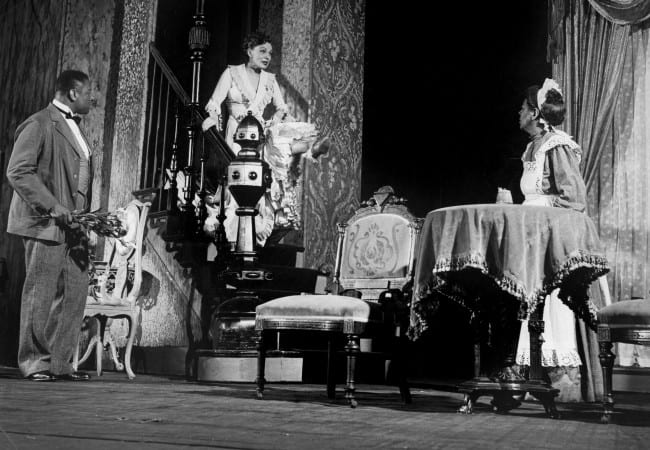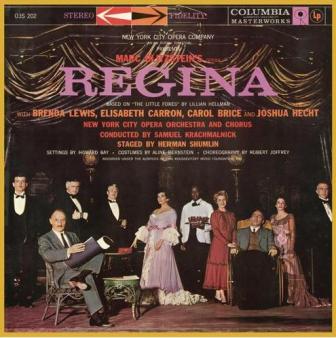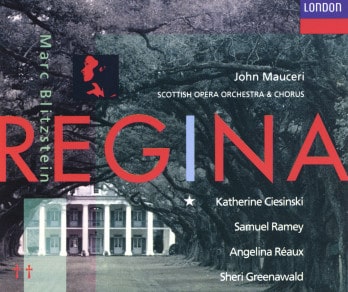Synopsis
Act I
The Giddens’ house in Bowden, Alabama, 1900. House servants Addie and Cal and Regina’s daughter Alexandra (Zan) are singing with the Angel Band on the porch. Regina interrupts to remind Zan to get ready for supper. Mr. Marshall, who is forming a business partnership with Regina’s brothers, Ben and Oscar, will be the guest. The guests assemble and toast the new partnership after the meal. After Marshall leaves, Regina and her brothers exult over their prospective fortune and talk about how they will spend it. Oscar’s wife Birdie longs to return to her childhood home (“Lionnet”). Ben and Oscar complain to Regina that her husband, Horace, has not put up his share of the capital yet. Regina reminds them that he is in the hospital in Baltimore and suggests that he is holding out for a larger share of the profits (“I Don’t Know”). Ben agrees that Horace and Regina will get a higher share, provided the money is ready within a week. He notes that the extra money will come out of Oscar’s profits and suggests that Oscar’s son Leo should marry Zan (“My, My”). Regina promises to consider it. Zan and Leo return, and Regina instructs Zan to travel to Baltimore the next morning and bring Horace back (“Away!”). Zan is reluctant, and Regina upbraids her. Then she dismisses everyone with an aria on getting what you want (“The Best Thing of All”). As Birdie leaves, she takes Zan aside and warns her that the family is plotting to marry her to Leo. Zan wonders about her future (“What Will It Be for Me?”) but says she will not marry Leo. As Zan goes upstairs, Oscar tells Birdie to leave with him. He slaps her for interfering with his plans as they exit.
Act II
One week later. As the house prepares for another party (“I Love a Party”), Leo confers with his father. He tells Oscar that there are thousands of dollars’ worth of bonds in Horace Giddens’ safe-deposit box, and Oscar suggests obliquely that he steal them (“I’m Bound to Get Mine”). Everyone is waiting for Zan and Horace to arrive. Addie sees them pull up and helps Horace, who has heart disease, into the house. He asks to be left alone as Zan goes upstairs. Horace asks Addie why he has been summoned home and Addie reveals that it is for his money. Regina, Ben, and Oscar come out to welcome him, then Birdie enters. Regina gets Horace alone and placates him, telling him that she had him come home because she missed him so. But soon they are quarreling again, and Horace realizes that Regina is up to something. He tells her that he doesn’t have long to live. Then Regina tells Ben to talk to Horace about the business proposition. For the first time, Horace understands why Regina had to bring him back, and he declines to be part of the partnership. He goes upstairs as Regina demands to talk to him (“We Have Waited for You”); meanwhile, Ben, Oscar, and Leo exit after a whispered colloquy. The chorus introduces the next scene with an ode to Regina (“Regina Does a Lovely Party”). Leo goes off as Horace meets his lawyer and tells him he will draw up a new will. Marshall enters, and the party gets underway. Jazz, one of the servants and band members, comments on the party (“Chinkypin”). On the veranda, Horace tells Regina he has not changed his mind. She is furious. She changes her tune quickly when an old beau, Bagtry, walks in (“Waltz”), but she dismisses him, preferring her possessions to human love. Then Leo enters with Horace’s bonds, and Ben and Oscar close the deal with Marshall. Regina accuses Horace of taking pleasure in her misfortune and declares that she wants him to die.
Act III
The next day. Addie, Zan, Birdie, and Horace are unwinding (“Rain” Quartet). Birdie recalls her childhood home (“Birdie’s Aria”). Zan exits with Birdie, and Horace tells Addie to take Zan away; he has left cash for her. Regina enters, and Horace explains that Leo stole the bonds; he goes on to explain that he will treat it as a loan and that he has left Regina the bonds in his will. She is furious and reveals that she never loved him (“Regina’s Aria”). Then Horace has an attack and drops his medicine. Regina makes no move to get the other bottle, and Horace tries to run upstairs for it but collapses. Ben, Oscar, and Leo enter and realize that Horace knows what they did. Regina threatens them with jail; Ben remonstrates with her (“Greedy Girl”). Zan comes downstairs, and it is clear Horace has died. Ben and Oscar realize they have no recourse and concede. Zan comes in to tell Regina that she is leaving for good. The Angel Band sings (“Certainly, Lord”) as the curtain falls.
Performance materials available on rental from European American Music.
Comment
Regina was first performed on Broadway in 1949. The decade between 1946 and 1956 was a time when composers openly and unashamedly composed operas or near-operas for a popular audience and expected to get away with it, flouting conventional wisdom, which held that the mere mention of opera would cause ticket buyers to flee en masse. Gian Carlo Menotti, Kurt Weill, Leonard Bernstein, and Frank Loesser, among others, all enjoyed successful runs on Broadway during that remarkable time. Blitzstein, whose The Cradle Will Rock (1937) arguably served as a precursor for the opera on Broadway trend (not to mention his one-act opera, Triple Sec , which was staged over one hundred times on Broadway as part of the Garrick Gaieties in 1930), himself contributed Reuben Reuben (closed out of town, 1955) and Regina.
The Broadway production ran a disappointing 56 performances, but the cognoscenti embraced the work (a group of Broadway professionals including Tennessee Williams, Cole Porter, Jerome Robbins, and Moss Hart actually took out a full-page newspaper ad during the run, hoping to revive declining attendance). A few years later, in 1953, Julius Rudel and the New York City Opera brought it back to the boards. Blitzstein revised the Broadway version, in some cases reverting to his original, which had been reshaped to fit more comfortably on a Broadway stage. For example, Blitzstein’s original ran to three acts, cut down to two in accordance with Broadway convention; City Opera restored the three-act structure. Some roles were made more vocally spectacular and a certain amount of dialogue was cut or set to music.
Critical reception was more favorable this time around, and Regina remained in City Opera’s repertory. When it was revived in 1958, the African-American onstage band (“the Angel Band”) was eliminated, along with other changes reflected in the first recording of the opera. Until 1990, performance materials from the 1953 City Opera version were the only ones available. These materials do not correspond precisely to either recorded version of the opera.
After a slump, the opera began to recover after 1980 and now has staked out a place in the repertory.
Further reading



